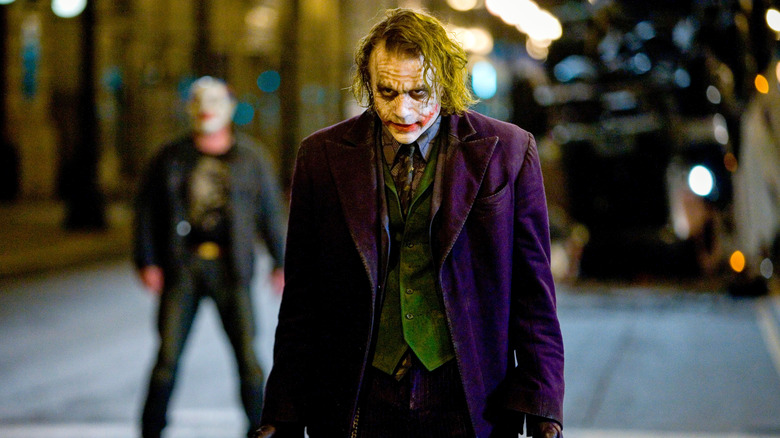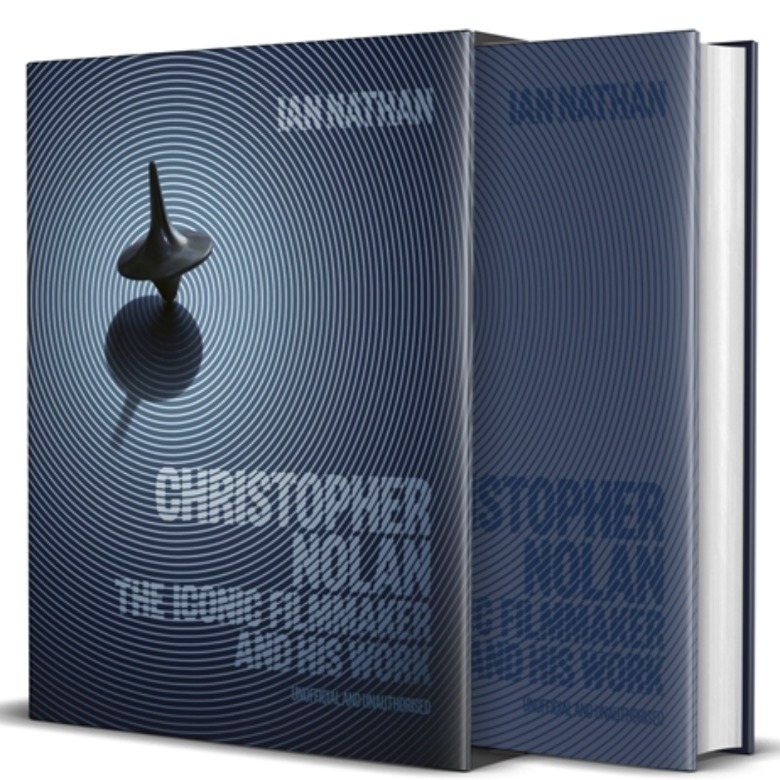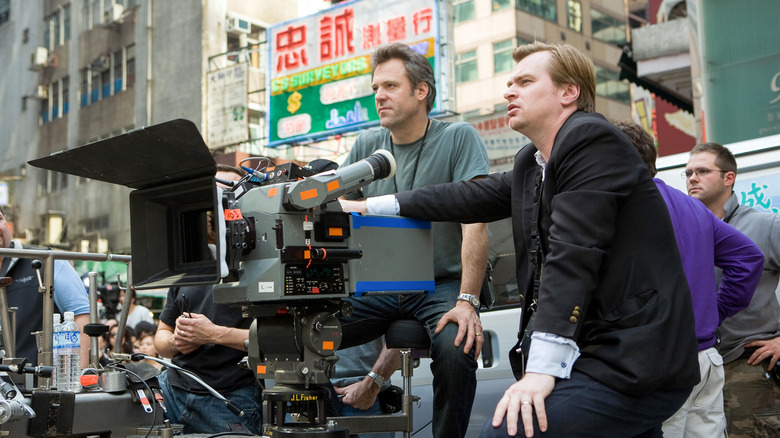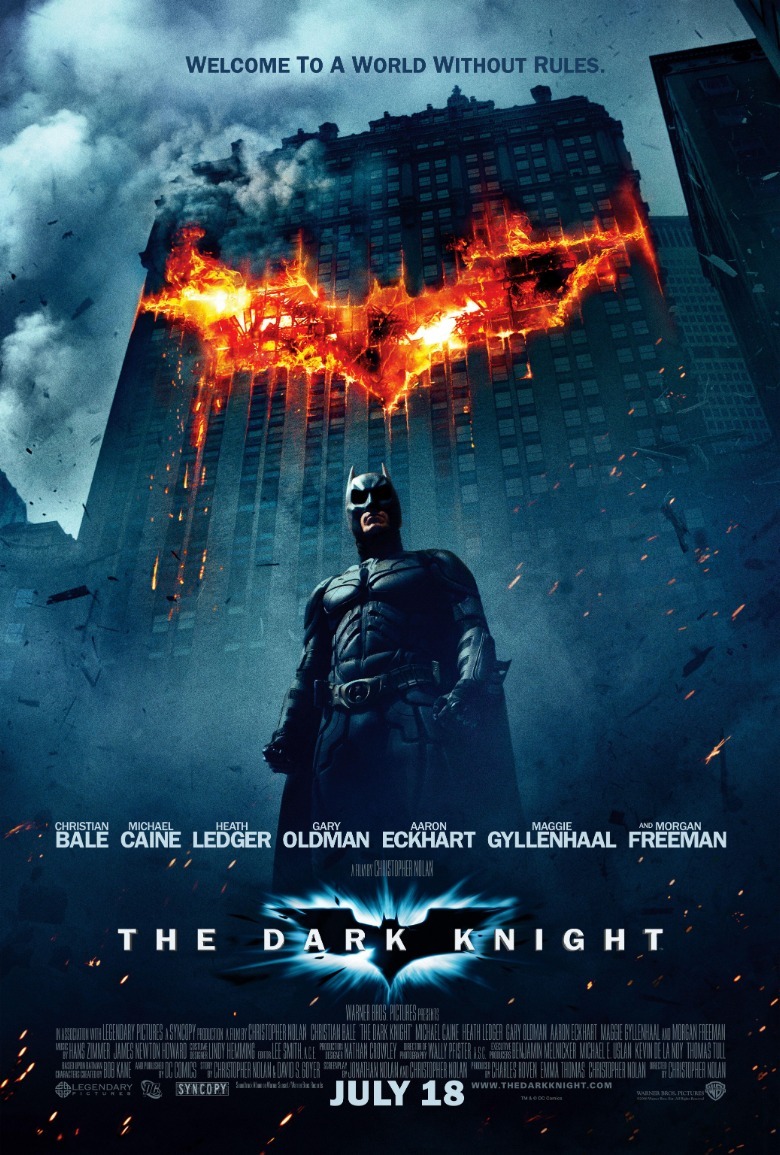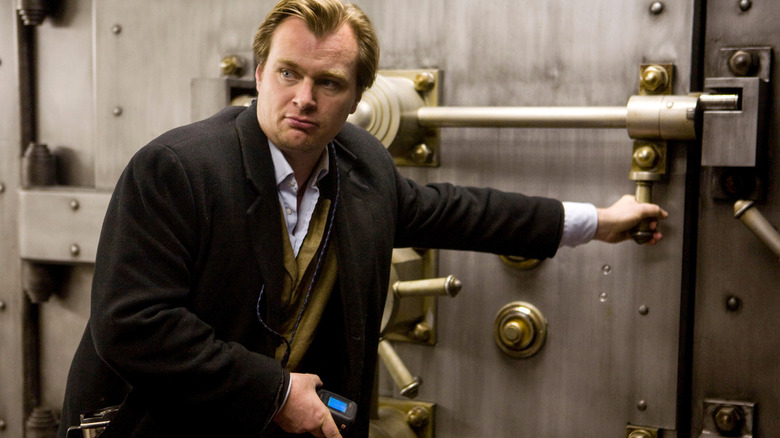Christopher Nolan: The Iconic Filmmaker And His Work Reveals How Nolan Wanted To Make The Joker Scary Again [Exclusive]
Whatever your thoughts on the work on Christopher Nolan, it's fair to say he's one of the biggest filmmakers working today. And it's also fair to say his Dark Knight Trilogy, specifically "The Dark Knight" itself, changed the movie landscape. Nolan's "serious" approach to comic books shifted everything and helped give birth to the current version of Hollywood, for better or worse. Described as a "comprehensive and in-depth study," Ian Nathan's new book "Christopher Nolan: The Iconic Filmmaker and His Work" promises readers something that "delves into the life and works of one of modern films most celebrated, successful and intriguing auteurs." Here's how the synopsis describes things:
This book will crack open the magic box of Nolan's twisting universe. As a character, he eludes easy answers. Veteran film author Nathan's research will lean into deciphering his cryptic pronouncements and motivations alongside the history and making of his films. Examining both the making of and the inspiration behind his many, many hit films, from The Prestige (2006) to the hugely successful Batman films, through to his mind-bending science fiction works such as Inception (2014) and Tenet (2020).
We have an exclusive excerpt from the book from White Lion Publishing, which drops on November 8, 2022, that dives into Nolan's approach to creating his version of the Joker in "The Dark Knight" — a performance that earned the late Heath Ledger an Oscar.
I wanted the Joker to be scary
The following is from Ian Nathan's book "Christopher Nolan: The Iconic Filmmaker and His Work."
For once, it was a trick he pulled on himself. The playing card that Gary Oldman's stalwart police officer James Gordon reveals in a Ziploc at the end of Batman Begins – the Joker, naturally – was intended as a tingle of anticipation and possibility to send the audience home with, no more than that. Christopher Nolan had no intention of maintaining a franchise; he had done his superhero bit, bringing Batman back from his decline into camp, and wanted to be away to pursue more personal, original material. This was only a tease, or at best a departing offering to the studio – the enticing question of what a revamped (as far as fans were concerned, a Nolanized) Joker might resemble. 'We wanted to suggest possibilities for how the story would continue,' he claimed, 'not because we were going to make a sequel.'
Nolan was innately resistant to the notion of repeating himself, or conforming to Hollywood norms, or genre norms, swapping out the villain with each movie. Inevitably you have to write with the returning actors in mind. And there was no contractual obligation. But there was an irresistible force emanating from the stalls. Jonah Nolan recalled watching Batman Begins on a sell-out opening night at Grauman's Chinese, in the very heart of Hollywood. He was nervous as hell. Will it work? It worked – and then they got to his brother's little send-off. 'Gordon flips over the Joker card at the end and the audience erupts like they're going to tear the place apart,[ he said. 'I've never heard a noise like it.'
As Warner Brothers pressed, the director stalled for time. 'You need to let the ideas you set up in the first film sit for a while,' he insisted; 'go off and do something else, returning to see how it looks.'
The creative worms began to squirm in his head a little sooner than expected. He had barely begun pre-production on The Prestige when his thoughts turned to the concept of 'escalation'4 posited by Oldman's Gordon – that the very existence of Batman would have an equal and opposite effect among the criminal class of the midnight city: flamboyant villains in the grand tradition would emerge from the shadows. The next of whom had already been announced. He seriously tried to picture the Joker through the realist prism of what he had done in his first Batman film. A paradoxical concept was becoming inevitable – he was going to make an original sequel.
'When you're dealing with questionable notions like people taking the law into their own hands, you have to really ask, where does that lead?,' he said.
This wouldn't simply be a progression of setting and character, an expansion of the comic-book mythos, it would be a progression in realism. Using the doctrine of genre as cover for his own agenda, he was 'going a little bit more into the crime story, a little more into the epic city stories of films like Michael Mann's Heat.' Such is Nolan's dedication to that neo-noir, in September 2016 he would host a 20th anniversary Q&A reunion at the Directors Guild, with Mann, Robert De Niro and Al Pacino, a flicker of fanboy eagerness to his questions. For now he was going to pay tribute with an entire film.
In a subsequent industry dominated by interlocking superheroic universes riveted to house style, such a shift in tone would be unthinkable. Nolan was basically telling the studio that he, the filmmaker, was the prize asset, not Batman. His demands to Warner were knowingly stringent. Four years to make his film, with absolute creative control. They didn't think twice.
Then he met producer and co-writer David S. Goyer for lunch. 'Okay, let's talk about a sequel,' he said. Their discussion would stretch for three months as they figured out the story, putting the main beats down on index cards. Then, while he gave himself up to the world of The Prestige, Jonah set to work on the script. They were still refining their story as they went into production, trying to compress a 'dizzying' array of subplots and action sequences, a vortex of moral conundrums, into a satisfying movie. They named it The Dark Knight, provocatively removing the word 'Batman' from the title.
It was never about the Joker for the Joker's sake. It was about figuring out the best story to tell about Bruce Wayne and then determining which villains from the canon fitted into that story. Alien and Aliens were always the story of Ripley, not the creature. 'It was a much more holistic approach and completely flies in the face of the way that a lot of other superhero films are developed,' said Goyer, and something the Marvel machine has struggled to understand. The Dark Knight put the characters and story ahead of paying service to the comic-books.
'I liked the [Tim] Burton films, a lot,' said Goyer, recalling that director's fantasias Batman and Batman Returns, 'but the one bone to pick with film, television, anything: I just never felt that the Joker was scary. Chris and I wanted the Joker to be scary.'
Not simply scary, but thematically diabolical. He wasn't so much a character as a catalyst – a dark philosophy for a new kind of Batman movie. 'The Joker is what I am afraid of more than anything,' declared Nolan, 'more than any of the villains, these days particularly, when you feel civilization is very thinly lined. I think the Joker represents the id in all of this.'10
15 years of filmmaking
Nolan is something of a divisive figure in the film nerd world. Some love him (obsessively), some hate him (also obsessively). While I don't think all of his films work as well as they should, I am a Nolan fan. He's one of the few filmmakers working right now still creating original work on a massive scale, and that's worth celebrating. I'd also argue his films, with their maze-like plots and huge set-pieces, are inherently rewatchable. I was a little disappointed with "Tenet" when I first saw it, but subsequent rewatches have turned it into one of my favorite Nolan movies.
If you're a Nolan fan, or even if you're not, "Christopher Nolan: The Iconic Filmmaker and His Work" offers insight into how Nolan goes about making his films, and that's something worth reading.
How has Nolan become this leading director? Is he the new Kubrick? What do audiences get out of his games? Visually, he offers a steely science-fiction noir with the highlights of big stars and a magician's flourishes, whether he is tackling Victorian London or the far reaches of outer space. In narrative terms, his films twist and turn, provoking as many questions as they answer. Best known for his cerebral, often nonlinear, storytelling, over the course of 15 years of filmmaking, Nolan has gone from low-budget independent films to working on some of the biggest blockbusters ever made. This book will crack open the magic box of Nolan's twisting universe. As a character, he eludes easy answers. Veteran film author Nathan's research will lean into deciphering his cryptic pronouncements and motivations alongside the history and making of his films.
Examining both the making of and the inspiration behind his many, many hit films, from The Prestige (2006) to the hugely successful Batman films, through to his mind-bending science fiction works such as Inception (2014) and Tenet (2020). Filled with fascinating insights and illustrated throughout with cinematography from his visually stunning oeuvre, along with an 8-page gatefold section, this book offers a unique, important and unmissable insight into the mind of this most brilliant of directors.
